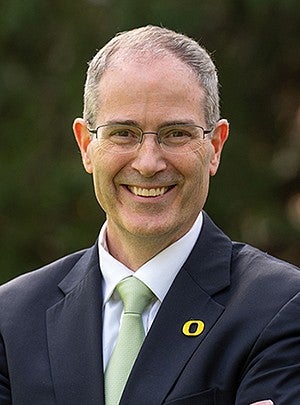The University of Oregon has been awarded a $650,000 grant to establish a new institute aimed at transforming the culture of leadership in higher education.
The Values-Enacted Leadership Institute will be funded in part by a three-year, $650,000 grant from the Mellon Foundation.
The institute builds on the work of the Humane Metrics in the Humanities and Social Sciences initiative, of which UO Provost Chris Long is a foundational member.
The Mellon Foundation has funded the metrics initiative to run workshops across institutions since 2016, and the leadership institute is the next step for that work, bringing teams of people together to identify their values and then put those values to use to transform their institutions.

Long is a principal investigator for the project, working with co-principal investigator colleagues and team members from the University of Maryland, Michigan State University, Carnegie Mellon University, the Modern Language Association and the European University Institute.
The metrics initiative will oversee the new institute, which plans to host summer workshops in Oregon for the next three years. Each year, five four-member teams will be selected to participate, with each team coming from the same university or college and representing humanities faculty, administration and staff.
Over three years, 60 faculty members, administrators and staff from 15 institutions will attend the workshops, where they will identify and implement the values that can reshape relationships and reinvent institutional practices. The teams will represent research universities, community colleges and liberal arts colleges, with targeted outreach to historically Black colleges and universities, minority-serving institutions, and other access-oriented institutions.
Universities in the United States are “in desperate need of reinvention,” the group’s proposal says. It goes on to say that can only happen by creating a “consortium of initiatives committed to working collaboratively toward a future in which our shared values align with the policies, practices and structures that bring the academy to life.”
“Change, like leadership, is collective, enacted by understanding and engaging the myriad connections, positionalities and agencies of those who take time to identify their shared values and put them into coordinated action to shape a better future,” Long said.
Long said establishing the leadership institute as he takes on his new leadership role at the UO demonstrates how high a priority leadership development is for him and for the university.
“To collaboratively create the university of the future — one characterized by and rooted in an ethos of justice, equity, access and joy — new sustainable communities of practice are required,” said co-principal investigator Bonnie Thornton Dill, Dean Emeritus and professor of gender and women’s studies at University of Maryland.
“This values-enacted leadership approach is designed to be wholistic, intentional and oriented toward interconnections with each other,” Long said, “and while it emerges from the humanities, what we have found is that many STEM fields are yearning for this kind of approach as well.
“So much of higher education and particularly around research assessment is grounded in the practices of STEM fields, and this initiative is grounded in the research of the humanities. Recognizing the vitality of our interconnectedness and the rich texture of our humanness, we have sought to bring this wholly into the academic enterprise.”
The project team consists of:
- Bonnie Thornton Dill, co-principal investigator: professor in the Harriet Tubman Department of Women, Gender & Sexuality Studies, and dean emerita of the College of Arts and Humanities, University of Maryland.
- Bonnie Russell, digital specialist, humane metrics initiative: assistant director, Mesh Research, Michigan State University.
- Jason Rhody, co-prinicipal investigator: senior director of engagement strategy, Modern Language Association.
- Nicky Agate, co-principal investigator, associate dean for academic engagement, Carnegie Mellon University: editorial director, Carnegie Mellon University Press.
- Penny Weber, project manager, humane metrics initiative: Michigan State University.
- Simone Sacchi, co-principal investigator: research data librarian, European University Institute.
—By Tim Christie, Office of the Provost


